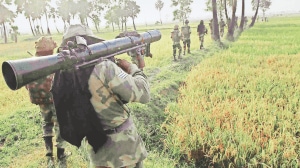Civil Aviation ministry should act on plea against pilots — HC
Mumbai, August 2: The Bombay High Court has put the onus on the Ministry of Civil Aviation to act on complaints made in a writ petition ag...

Mumbai, August 2: The Bombay High Court has put the onus on the Ministry of Civil Aviation to act on complaints made in a writ petition against arrogant Air-India pilots who inconvenienced passengers.
Chief Justice B P Singh and Justice N J Pandya disposed of a writ petition after the counsels appearing for the parties agreed that the petitioners shall make a representation to the Ministry of Civil Aviation who will dispose it of with a reasonable order. The Ministry shall communicate the same to the petitioners within a period of four months, the bench ordered.
Additional Solicitor-General S B Jaisinghani said he would forward a copy of the petition to the Ministry of Civil Aviation, on whose behalf he appeared, and this shall be treated as a representation. The bench directed that despite the order that may be ultimately passed by the Ministry, if the petitioners are aggrieved they shall seek remedy in accordance with the law.
In their petition, petitioners, Santosh Thakur, Yusuf Lanewalla and Anandram Sujir, said that the management of Air-India was helpless before the pilot community and its various group of employees. The pilots, in particular, were holding the entire functioning of AI to ransom with their high-handed behaviour. They had also caused inconveniences to the passengers by their acts. This conduct was in utter violation of the Suppression of Unlawful Act against Safety of Civil Aviation (Amendment) Act (SUASCA), 1994.
The petition was filed against Air-India, Civil Aviation Secretary, Director-General of Civil Aviation, Indian Pilots’ Guild, Indian Flight Engineers’ Association and Air-India Employees’ Guild, Air-India Officers’ Association, Captains R S Sodhi, N S Jadhav, D S Bhatti, S G Maulik, T K Kannan and D Majumdar.
The petitioners relied on newspapers which reported the various incidents where passengers were made to bear the brunt due to the whimsical behaviour of the pilots. For instance, on January 28, 2000 a woman-passenger was forced to stand for six hours on the Delhi-Hong Kong flight after she was humiliated by the First Officer D S Bhatti. Bhatti woke up the woman-passenger, Shahdadpuri, who was occupying 2G aisle seat, and asked her to return to her original seat 3A.
When she wished to know why she was was told it was originally assigned to Bhatti. The flight supervisor asked her to vacate the seat for Bhatti. As a mark of protest, the passenger stood for the entire flight for six-and-a-half hours. She was persuaded to sit for landing but refused. Later, the entire crew apologised to her.
In another incident, an AI-129 with 470 passengers on board was to take off but at the last moment the commander left the aircraft unattended without assigning any reason. The next 12 commanders, who were contacted, refused to operate the flight giving personal reasons which resulted in the cancellation of the flight altogether.
In a third reported incident, on February 14, 2000, Captain N S Jadhav on flight AI-700 from Dubai-Kochi had to divert the flight to Mumbai as one of the passengers suffered a cardiac arrest. The diversion was under compelling circumstances but Jadhav refused to operate the flight from Mumbai to Kochi on the ground that his duty had expired. This resulted in a nine-hour-long delay for about 400 passengers on the flight.
In the fourth reported incident, on 30 March 2000, Captain R S Sodhi, who was commmandering AI flight 101 Mumbai-London-New York directed that the staff on leave should be accepted on the flight after offloading a huge amount of revenue paid cargo. When his request was declined, he refused to operate the flight. The delay caused by him led to expiry of the flight duty time. AI was compelled to call fresh crew and the flight was delayed further.
The petitioners contended that each pilot earned anywhere between Rs 40 lakh to Rs one crore, but the services rendered by them was much below world standards.
They added that the practice prevalent in the payment of wages and perks for pilots were in the nature of “daylight robbery” .
The petitioners, who were represented by Nitin Thakkar and G S Kulkarni, instructed by O P Sohoni, prayed for appropriate action under SUASCA Act against persons who were directly and indirectly disrupting the aviation services and to determine the extent of loss suffered by AI on account of the acts and omissions on the part of the pilots, co-pilots and crew members.



- 01
- 02
- 03
- 04
- 05




























